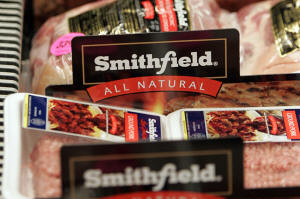Pork giant Smithfield's CEO touts growth outlook, minimizes threats from
deportations, bird flu
 Send a link to a friend
Send a link to a friend
 [January 29, 2025] By
JOSH FUNK [January 29, 2025] By
JOSH FUNK
Smithfield Foods' CEO says he hopes that everything the company has done
to make working in its plants more attractive ever since COVID tore
through the industry during the pandemic will help it weather the impact
of President Donald Trump’s promised mass deportations.
Smithfield went public Tuesday more than a decade after the world's
largest pork producer was bought by China's WH Group. CEO Shane Smith
says he believes the company is positioned to grow in the next few
years. He said Smithfield has streamlined its costs and is focused on
more profitable packaged meats business through its brands like Eckrich,
Armour and Nathan’s Famous.
The company's shares went on sale for $20 and dipped less than a dollar
in trading Tuesday before finishing close to the offering price,
generating about $522 million for the Smithfield, Virginia-based
company.
Smith said he is watching President Trump’s immigration policies
closely, but he hasn’t seen any Immigrations and Customs Enforcement
raids at any of the company's 41 plants yet, and Smithfield has done
everything it could to comply with labor laws and minimize the number of
undocumented immigrants in its workforce.
“We follow all federal and state employment guidelines at each of our
facilities,” Smith said. “I’m not going to speculate on what will or
will not happen. But what I can tell you is that we believe as we look
across those 41 different plants, we believe that we’re positioned as
well as we can be.”

He said the company has also worked to reduce the number of contractors
it uses in its plants to give it more control over hiring and costs.
That should also reduce the chances of children working in Smithfield's
plants as the labor officials documented over the last couple of years
at some of the companies hired to clean slaughterhouses overnight.
Meatpacking companies have long relied on immigrants who are willing to
take on the hard physical work in their plants. But Smith said
Smithfield has “really worked toward becoming an employer of first
choice in those communities. And what that means is if you’re the
employer of first choice then you typically get the top of the workforce
in that local community.”
So far, the fears about raids in the immigrant community haven't led to
a drop in the daily slaughter figures that USDA reports across the
industry, so it doesn't appear that many workers are staying home.
The turnover rate at most Smithfield plants is now at or below where it
was before the pandemic forced the industry to temporarily close down
plants and take other measures such as adding plastic barriers between
workstations and require masks and temperature checks for workers.
Conditions in slaughterhouses offered a prime opportunity for COVID to
spread in the first year of the pandemic.
Smith and other Smithfield executives took a lot of lessons out of the
pandemic, and have worked to improve their relationships with workers at
their plants across 19 states, while also investing in automation
wherever possible. They've also tried to make sure the company's plants
have extra capacity to adjust when needed.
[to top of second column] |

Smithfield Foods products are on display at the Ukrops store
in Richmond, Va., March 10, 2009. (AP Photo/Steve Helber, File)
 The fact that Smithfield is
controlled by Chinese investors sometimes generates criticism in
today's political climate when ownership in that communist country
got TikTok briefly banned in the United States earlier this month.
WH Group plans to hang onto more than 91% of Smithfield's shares
even after the IPO, so that's not going to change, but Smith said
the company is built on American workers processing animals raised
in the United States and selling most of its products domestically.
"There’s always noise in the background, but the reality is our
business is an American business," Smith said.
Smithfield has sold off more than one-third of the farmland it owns
in the past couple of years, which might help lessen the concerns it
hears mostly from Republican lawmakers about foreign ownership of
U.S. farmland. Smithfield does still hold about 85,000 acres of
farmland, but Smith said the decision to sell of about 45,000 acres
was made to help reduce the company's costs and streamline
operations — not because of political pressure.
Smithfield said that in the first nine months of 2024 it generated
$581 million net income on $10.2 billion in sales. That was a nice
rebound from 2023 when the company had a $133 million loss on the
full year as it grappled with high feed costs and recorded $208
million in charges related to settlements of price-fixing and
wage-fixing lawsuits.
Smith said investors should look closely at all the growth the
company has seen in its packaged meats business as it has emphasized
those higher-margin products.
Smithfield hasn't been hurt by the bird flu outbreak that has
disrupted the egg and poultry businesses over the past three years,
but now that the virus has started infecting dairy cattle the
company has tightened up the biosecurity measures on the farms where
its hogs are raised to help protect them from any illnesses.
Smith said he hasn't seen any evidence yet that bird flu will jump
to pigs, but that virus has infected a wide range of species since
the outbreak began, so Smithfield isn't taking any chances to keep
disease risk low.
“We basically take the approach that anything outside of the farm we
consider dirty, and anything inside the farm we consider clean. So
anything coming in to our farms, we pay a lot of attention to,”
Smith said.
All contents © copyright 2025 Associated Press. All rights reserved
 |